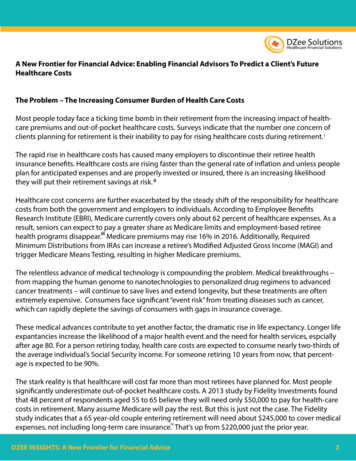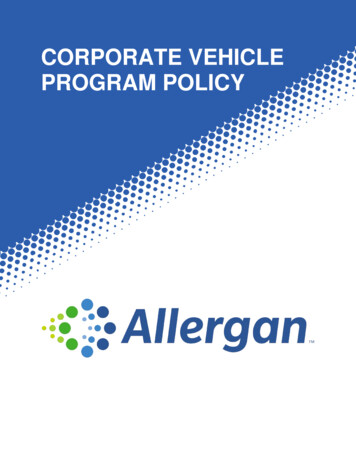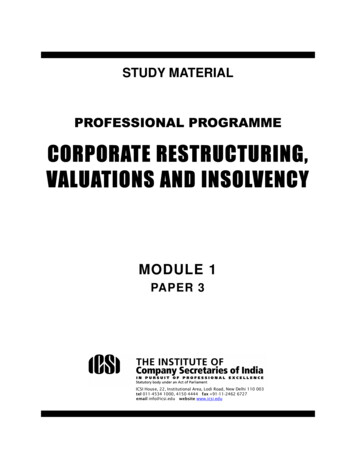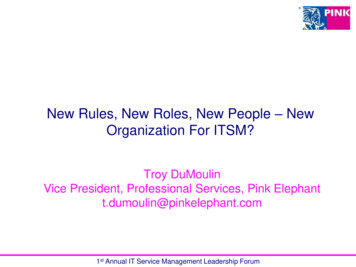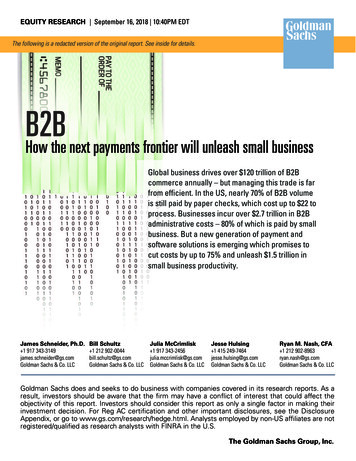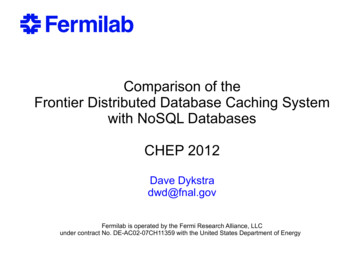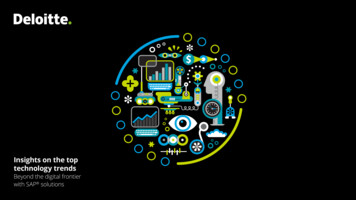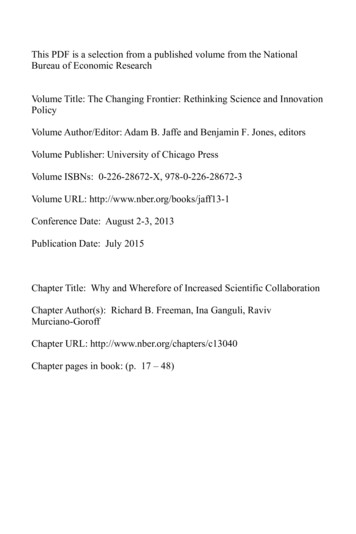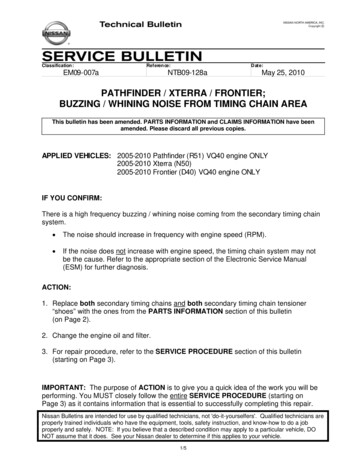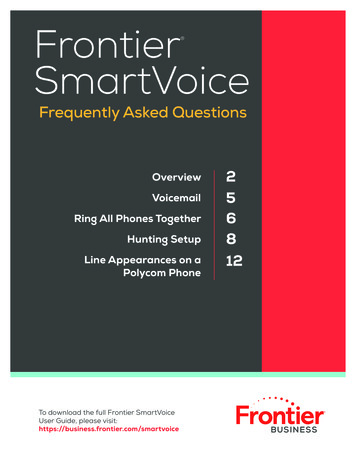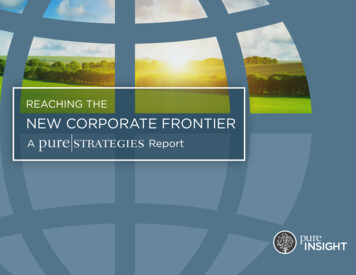
Transcription
REACHING THENEW CORPORATE FRONTIERAReport
Extraordinary challenges call for essential strategies Arable and productive land is rapidlydeclining, expected to drop 75%between 1960-2050PRODUCTIVE RESOURCESGreenhouse gas emissions must bereduced 40-70% by 20501CLEAN ENERGYHazardous chemicals from everydayproducts are universally present in dustand breast milkSAFER MATERIALSNearly 1 billion people worldwide areaffected by severe hunger and povertyFAIR OPPORTUNITIES to build a sustainable and circular economy.A circular economy utilizes a continuous flow of resources in cycles to avoid waste,relies on renewable energy and safe materials, and supports social justice.1Compared to 2010 to stay within some of the more conservative climate warming thresholds according to the Intergovernmental Panelon Climate Change in the Climate Change 2014 Synthesis Report Summary for Policymakers.31
BUILDING A SUSTAINABLE AND CIRCULAR ECONOMY PRODUCTIVE RESOURCESVE RESOURUCTICESDORP1.6 times more is2016companies rely on ! ORTUNITIESR OPPIAFtargets demandrenewable power capacityto double by 2030AN ENERGYCLE 2016GHG reductioncommunitiesMeeting retailerrequirements for saferproducts isER MATERIAL69%201926%46%2019SAFER MATERIALS201664%79%2019FAIR OPPORTUNITIES201648%76%2019BUSINESS VALUE driving progressSA F36%CLEAN ENERGYused from nature thanour planet can renewA key approach ishelping the% of 153 companies surveyed withwell-advanced efforts in:SThe majority of firms surveyed did not have quantitative targetsin critical areas, and as a result they are not holding themselvesaccountable for necessary progress.Respondents reported earningbillions of dollars across productivity,reduced risk, and enhanced growthopportunities.MEANINGFUL CHANGE NEEDEDNow is the time for companies to act.They must establish meaningful targetsand focus their investments to meetthe urgent call to global action andhelp reach the new frontier.32
Mobilizing resourcesThe urgent need for transformational progress in sustainabilityechoes the call to action in the U.S. to get a man on the moonand safely back to Earth in the 1960’s. As President John F.Kennedy said, “We have the resources and the manpower;”we just need focused investment and effort.Rising to the task, sustainable and responsible investing (SRI) isreaching new levels, with one out of every five dollars under professionalmanagement in the U.S., totaling 8.72 trillion. Corporate efforts havea similar course.Walmart is the top retailer drivinginvestment in sustainability, fromPure Strategies’ surveys done in2013, 2015, and 2016.2016 survey asked (open ended): Namethe top three retailers in order of importancedriving your organization to invest insustainability.60Bank of America aims to put 125 billiontoward solutions to climate change and otherenvironmental challenges by 2025.50840The IKEA Group is investing over 2 billionin renewable energy by 2020.24302010Sustainable and responsible investinghas never been greater.226587100WalmartTarget5Publix(Number of respondents from a sampleof 153 listing the retailer first, second,third, bottom to top)33
Mobilizing resourcesPure Strategies’ research found a consistent trend of growth in corporatespending in sustainability, across three surveys since 2013. In this survey, 81%of the sample expected an increase in budget between 2016 and 2017.A notable portion of this growing investment is expected to support changingcompany business models. Shifts to products as services, virtual offerings,or other new business approaches are anticipated to increase the most overthe next three years—over other approaches (e.g., engaging consumers, bringing sustainability into product development) that drive the needed strategies.Further, companies earning the greatest business value from their sustainabilityefforts are putting more emphasis on these approaches than other firms.The most valuable approach accelerating sustainability identified inthe survey was bringing sustainability into product innovation, design, anddevelopment. Respondents noted that advancing sustainable agriculturecalls for a unique approach, relying on sustainable sourcing and supplierengagement.Corporate heads of sustainabilitywho expect a double-digitbudget increase from 2016-201734%Portion of sample who expectan increase from 2016-201781%Signs of progressThe resources companies have invested are sparking progress, moving beyondincremental changes to meaningful actions that align with a sustainable andcircular economy, with productive resources, clean energy, safer materials,and fair opportunities.34
PRODUCTIVE RESOURCESCompanies with well-advancedresource efficiency effortsWe use 1.6 times more from nature than our planet can renew each year.Thus, there is a need for efficient and regenerative use of resources so they areavailable in the future (e.g., restoring carbon loss in soils).Resource efficiency is a cornerstone of sustainability, such as minimizingenergy and water use in processing, but interest in scaling up was limited.Companies need to increase efforts to close resource loops and reuse materials.As a means of investing in productive resource use, those surveyedexpect sustainable agriculture engagement to grow across industries in thenext three years. Apparel companies plan to ramp up from 52% using sustainable sourcing in 2016 to over 82% in 2019. Additional efforts include themulti-stakeholder Midwest Row Crop Collaborative, launched in 2016, workingto use fertilizer efficiently and build soil health through technical informationand resources to scale best practices across grain production in the U.S.201636%201969%SURVEY RESPONDENT GOALS:“80% of crops used by our processing plants grown using drip irrigation by 2035.”“Reduce our energy consumption 20% this year by utilizing energy from our waste products.”COMPANY EXAMPLE:Hellmann’s has been advancing sustainable soy production, to meet Unilever’s 2020sustainable sourcing goal. Through its Sustainable Agriculture Code and partnerships,it helped farmers improve yield, reduce soil erosion, and increase conservation tillage,providing greater supply chain resilience.35
CLEAN ENERGYRenewable energy is a critical strategy for achieving science-basedgreenhouse gas (GHG) reduction targets, to keep climate warming towithin recommended limits, demanding renewable power capacityto double by 2030. While just under 30% of companies surveyed havequantitative renewable energy goals, momentum is growing.The number of companies shifting to use more renewable energy isanticipated to nearly double in the next three years. Top performingfirms, in the survey, are expecting to rely most on renewable powerpurchase agreements over the next three years. Firms leading the wayinclude the nearly one hundred companies committed to 100%renewable energy through RE100.Companies with well-advancedrenewable energy efforts201626%201946%SURVEY RESPONDENT GOALS:“Use 100% renewable energy by 2020.”COMPANY EXAMPLE:Apple aims to be powered by 100% renewable energy and is not far from reaching thatgoal. The global company receives over 90% of its energy from renewable sources.U.S. operations already reached 100% through a combination of on-site generation andmarket purchases, making Apple one of the largest on-site renewable energy producersin the U.S.37
SAFER MATERIALSCompanies are taking steps to move away from using materials that arenot inherently safe. There is a connection to retailer efforts, such as thoseof Walmart and Target. Meeting customer requirements was the area ofmost activity in sustainable chemicals management, with 70% of surveyrespondents reporting advanced efforts.Companies with advancedefforts in sustainable chemicalsmanagement201664%Company investment in the next three years is on target to addressissues and move to safer materials. Survey respondents noted a focus on: Understanding which chemicals and materials are inproducts and supply chains Assessing chemicals of concern and safer alternatives201979%SURVEY RESPONDENT GOALS:“100% removal of harmful chemicals in the next 5 years.”COMPANY EXAMPLE:Walmart has a sustainable chemistry policy for home cleaning, personal care, andcosmetic products. Initial focus was on increasing ingredient transparency and thereduction of high priority chemicals. Between 2014 and 2015, the company achieveda 95% reduction of the weight of high priority chemicals in Walmart stores.38
FAIR OPPORTUNITIESCompanies with advancedefforts in supporting farmers(e.g. training)The United Nations’ Sustainable Development Goals highlight criticalsocial needs from eliminating poverty to ensuring decent work andquality education.Survey respondents indicated that a key approach is helping thecommunities they rely on, such as supporting famers with training andtools to increase crop productivity in sustainable ways which will helpreduce poverty and hunger and bring economic growth.201648%201976%GOAL FROM KEURIG GREEN MOUNTAIN:“Engage 1 million people in our supply chains to significantly improve their livelihoods,including water security and climate resilience.”COMPANY EXAMPLE:Nestle implements comprehensive sustainable agriculture approaches for many ofits top commodities, including direct farm engagement. Through this work, thecompany has provided training to over 44,000 cocoa farmers, distributed 1.6 millioncocoa plants, and built or refurbished 40 schools over four years.39
Business ValueThe 153 survey respondents gained several billion dollars fromsustainability efforts in one year. Respondents reported earningapproximately 800 million from increased sales and another 800 millionin manufacturing cost savings, with additional value across otherreduced risk, productivity, and enhanced growth opportunities.A positive sign is that companies that report earning the most fromsustainability plan to further increase their budgets, illustrating the linkbetween sustainability program investment and business benefit.Smithfield gained 11.5 million in 2015 fromoperational byproducts alone—from recyclingcardboard to selling bacon grease and capturingbiogas.Unilever reported 30% faster growth for itsbrands with a sustainability purpose, comparedto the rest of the business, with these contributing nearly half of the firm’s total growth in 2015.Three of the top five brands driving this value areengaged in sustainable agriculture.TOP BUSINESS BENEFIT FOR SOMEOF THE ESSENTIAL STRATEGIES% of companies that achieved thebusiness benefit52%achieved supply chaincost savingsand risk reduction41%achieved regulatoryrisk mitigation26%achieved improvedemployee engagement310
Meaningful change neededAbout the researchThe need is extraordinary; resources are being mobilized; momentumis growing and there is value to be gained. But are we doing enough?GreenBiz and Trucost found that current GHG-reduction projects accountfor less than 7.5% of what is needed every year between now and 2050.The Pure Strategies’ survey results align with this and suggest otherareas are likely falling short as well.In 2016, Pure Strategies fielded a survey,through research firm Verdantix, with 153sustainability leads in global companies withrevenue of at least 250 million. The industriesincluded: food and beverage; apparel andfootwear; life sciences and medical products;electronics and appliances; home care andcleaning; personal care and cosmetics; andgeneral merchandise. Pure Strategies conductedsimilar studies in 2015 and 2013 that alsoinformed this report.About Pure StrategiesThe majority of firms surveyed did not have quantitative targetsin critical areas, and as a result they are not holding themselvesaccountable for necessary progress.Now is the time for companies to act. Firms must establish meaningfultargets and focus their investments to meet the urgent call to globalaction and help reach the new frontier.Pure Strategies has been transforming business through sustainability performance since1998. Our team helps companies initiate andenhance existing sustainability programs bysetting meaningful goals, devising effectivemanagement strategies, and making changes toproducts and supply chains that deliver valueto the business and society. Our clients includeWalmart, Annie’s Homegrown, Organic Valley,Seventh Generation, Colgate-Palmolive, Ben &Jerry’s, and Radio Flyer.MASSACHUSETTS, USAVIRGINIA, USACONTACT US47R Englewood RdGloucester, MA 019302634 Wild Cherry PlaceReston, VA 20191Main phone: (978) 525-0480Main email: info@purestrategies.compurestrategies.com
Hellmann’s has been advancing sustainable soy production, to meet Unilever’s 2020 . sustainable sourcing goal. Through its Sustainable Agriculture Code and partnerships, it helped farmers improve yield

